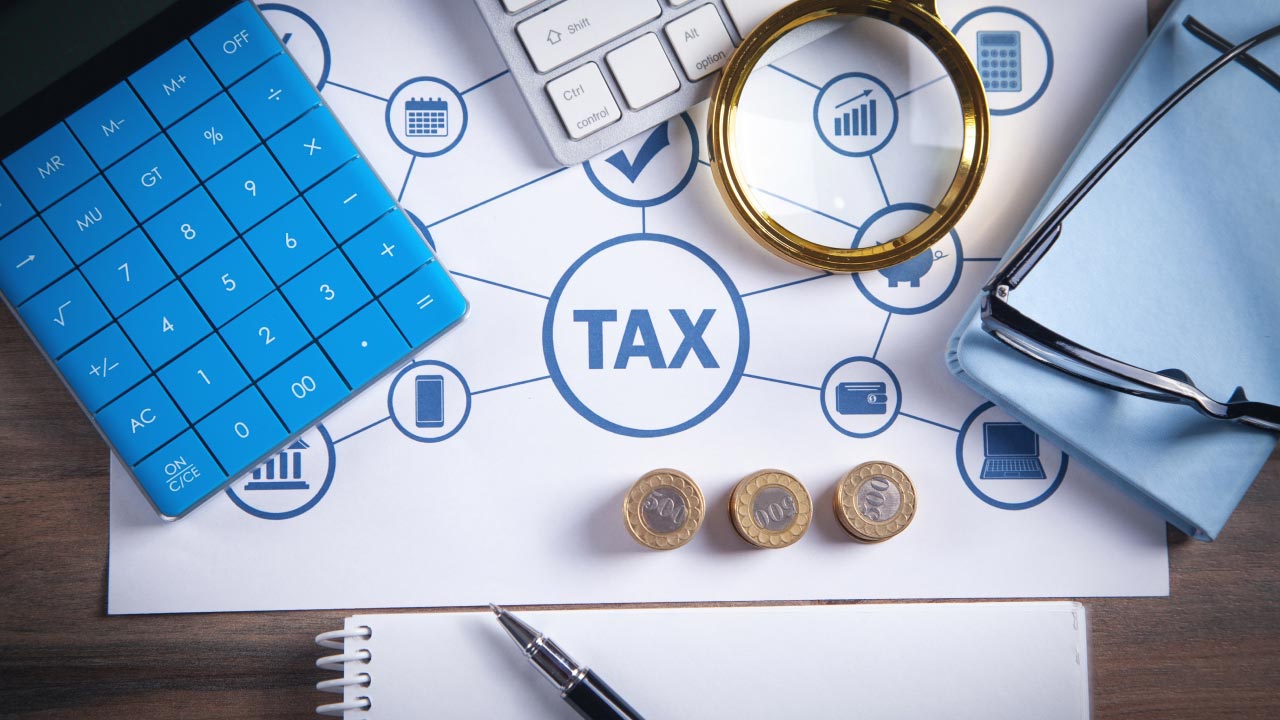Do You Pay Tax On Forex Trading (Detailed Guide)
Wondering do you pay tax on forex trading? This guide breaks down what traders need to know about tax rules, reporting, and obligations.

Forex trading can be exciting, but the thrill often comes with a dose of reality. Taxes on your gains might not be the first thing you think about when trading currencies, but they can sneak up on you. It's one of those necessary evils you need to understand—especially when you're looking to learn trading and want to know where to learn trading the right way. That’s why we've written this guide to clear up the confusion around taxes and help you make the most of your trading potential.
To get you there, Aqua Funded’s funded trading program is your best bet. With resources and support tailored to real-world challenges, you can maximize your trading potential and focus on what truly matters.
Do You Pay Tax On Forex Trading

When it comes to foreign exchange taxation, things aren't straightforward. Tax obligations vary by country but typically fall into two primary categories: capital gains tax or income tax. Your trading activity's classification will depend on your trading habits, approach, and local tax laws.
The Record-Keeping Challenge in Forex Trading
Tracking your forex activity for tax purposes is no small feat. Forex trading often involves numerous transactions with different currency pairs, creating a complicated paper trail. While most brokers provide year-end statements, these usually lack the detailed information that tax authorities demand.
Casual Investor vs. Professional Trader: What’s the Difference?
The line between being a casual investor and a professional trader is a big deal in most places. It dictates which tax rates apply and what expenses you can deduct. But here's the kicker: you don't get to decide this status. Tax authorities look at various factors like how often you trade, how long you hold positions, and if trading is a significant part of your income.
Join Our Funded Trading Program Today - Trade with our Capital and Keep up to 100% of the Profit.
Turn your trading skills into substantial profits without risking your capital. AquaFunded lets you access accounts up to $400K with the most flexible trading conditions in the industry, no time limits, easy-to-achieve profit targets, and up to 100% profit split. Join over 42,000 traders worldwide who've already collected more than $2.9 million in rewards, all backed by our 48-hour payment guarantee. Start trading today with instant funding options or prove your skills through our customizable challenge paths and keep up to 100% of what you earn.
How Are Forex Traders Taxed

Forex Taxation Varies: What You Need to Know
Taxes on forex trading can differ widely based on your country and how you’re classified as a trader. Are you a retail trader, a professional, or a business entity? Where you fit in makes a big difference in how you’re taxed. For instance, in the U.S., forex trades fall under either Section 988 or Section 1256 contracts. Meanwhile, in the UK and EU, you might be looking at capital gains tax or income tax, depending on your trading style. In Switzerland, speculative trading and professional trading have different tax treatments, which also involve social security contributions.
U.S. Forex Tax Rules: The 988 and 1256 Dilemma
In the United States, most forex traders are covered by Section 988, which treats gains and losses as ordinary income or loss. This can be beneficial if you have losses since they can offset other income. However, profits get taxed at your rate, which can be higher. Some traders choose Section 1256, which is more favorable for futures and options. Here, 60% of your gains are taxed at the long-term rate and 40% at the short-term rate. This often results in a lower tax burden. But you need to elect this option with the IRS before the tax year starts.
Global Differences in Classifying Forex Profits
Outside the U.S., forex earnings might be classified as either capital gains or income. In the UK, personal forex trades usually fall under Capital Gains Tax, but if you’re trading professionally, it might be taxed as income. In Germany, profits are often labeled as speculative gains with a one-year holding period for tax-free status.
Frequent traders face income tax and strict reporting. France has similar rules, where occasional traders pay capital gains tax, but professionals pay more due to social security contributions. Some Eastern European and Baltic countries offer flat tax rates, but classification still matters.
Professional vs. Retail Trader: Why It Matters
Being a pro trader instead of a casual one comes with both perks and responsibilities. Pros can usually deduct more expenses, like software or home office costs. But they might also have to pay self-employment taxes or contribute to social insurance. In Switzerland, professional traders deal with stricter reporting and self-employment taxes based on trading frequency, leverage, and income reliance.
Forex Tax Reporting: What You Need to Document
Wherever you are, tax authorities expect detailed records. You’ll need to keep track of every trade, including date, currency pair, size, entry and exit prices, and profit or loss. Store all broker statements and transaction logs. Incomplete reporting can lead to audits or penalties. Some places require quarterly tax filings, while others only need annual ones. Trading with offshore brokers can make reporting more complex due to global tax compliance frameworks like CRS or FATCA.
How Forex Traders Can Be Tax Efficient
To cut your tax bill legally, many traders use specific strategies. In the U.S., elect Section 1256 treatment if you qualify. Some traders operate through corporate entities if it means better tax treatment, as seen in countries like Canada or Germany. Offset gains with capital losses from other investments or use loss carry-forwards if allowed. Consider tax-efficient places for trading, like the UAE or Singapore, but be careful of rules meant to prevent tax avoidance.
Related Reading
- How Long Does It Take To Learn Day Trading
- How Long Does It Take To Learn Forex Trading
- How Do You Backtest A Trading Strategy
- Which Trade Is Best For Beginners
- How Many Day Traders Are Successful
- How To Start Trading As A Student
- How Much To Start Day Trading
- How To Do Trading Business
- Forex Trading Psychology
How to Report Forex Income on a Tax Return

Understand Your Forex Activity
Before you report forex income, figure out how your trading is classified. Are you more of a casual investor, or is trading your full-time gig? Your classification, whether as an investment or a business, will dictate how you’re taxed.
For Personal Investors
Capital Gains Tax (CGT) May Apply
If you dabble in forex, your profits will likely be capital gains. Losses will be capital losses, offsetting other gains. Some systems provide discounts or exemptions if you hold a position for a while, like over a year.
How to Report
Enter your total gains and losses in your tax return’s capital gains section. Include the date you acquired and disposed of the asset, proceeds, and cost base, and net gain or loss. Convert all amounts to your local currency using either the transaction date exchange rate or an average rate, if allowed.
For Active Traders and Forex Businesses
Ordinary Income Tax Applies
If you’re trading like a business, with a structured and profit-focused approach, your earnings are considered ordinary income. The good news? Most trading-related expenses, like platforms and education, are deductible.
How to Report
Show your gross trading income and expenses in the business or self-employment section of your tax return. Keep detailed records of trades, amounts, and tools used. Use consistent exchange rates for currency conversions.
Handle Forex Losses Smartly
Use capital losses to offset other gains. Business losses might be deductible against other income, depending on local rules. Whether unrealized gains or losses are taxable depends on your accounting method.
Realized vs. Unrealized Gains
Realized gains occur when you close a position and confirm profit or loss. Unrealized gains are paper profits from open positions. Tax rules differ; some places tax only realized gains, while others may require unrealized values under specific methods.
General Tax Reporting Tips
Recordkeeping
Keep detailed records of your forex trades—date, time, amount, currency pair, profit or loss, exchange rate, and any fees.
Currency Conversion
Convert all amounts to your local currency using either the spot rate on the transaction day or a recognized average rate, based on local rules.
Supporting Documents
Retain all documents that support your tax return entries—broker and bank statements, screenshots, and tax software reports.
Pro Tips for Accurate Reporting
Use reliable tax software or spreadsheets to track your trades. Stay consistent in currency conversion and income recognition. Consult a tax advisor if you’re unsure about your trading classification. Declare all profits, even from foreign platforms, to stay compliant.
Join Our Funded Trading Program Today - Trade with our Capital and Keep up to 100% of the Profit.
Turn your trading skills into substantial profits without risking your capital. AquaFunded lets you access accounts up to $400K with the most flexible trading conditions in the industry, no time limits, easy-to-achieve profit targets, and up to 100% profit split. Join over 42,000 traders worldwide who've already collected more than $2.9 million in rewards, all backed by our 48-hour payment guarantee. Start trading today with instant funding options or prove your skills through our customizable challenge paths and keep up to 100% of what you earn.
Related Reading
- Option Trading Technical Analysis
- Forex Trading Strategies For Beginners
- Trading Strategy For Beginners
- Technical Analysis For Options Trading
- Profitable Gold Trading Strategy
- Is Day Trading Worth It
- Traders' Technical Analysis
- How To Learn Trading Online
- Is Day Trading Hard To Learn
- Position Trading Strategy
11 Tips to Be a Successful Trader

1. Trade Smart with Aqua Funded
AquaFunded lets you turn your trading skills into profits without risking your own money. You get access to accounts up to $400,000, with flexible conditions like no time limits and easy profit targets. They offer instant funding options or customizable challenge paths, allowing you to keep up to 100% of what you earn. AquaFunded is trusted by over 42,000 traders worldwide, who’ve already earned more than $2.9 million in rewards. They even guarantee payments within 48 hours.
2. Stay Informed to Stay Ahead
Knowledge is your ally in trading. Keep up with the latest stock market news and events, such as interest rate plans, economic indicators, and other financial news. Create a list of stocks you’re interested in and stay informed about them, along with general market trends. Bookmark reliable news outlets and make it a habit to scan business news regularly.
3. Risk Only What You Can Afford
Determine how much capital you can risk on each trade. Successful traders usually risk less than 1% to 2% of their accounts per trade. For example, with a $40,000 account, risking 0.5% means your maximum loss per trade is $200. Use suitable brokers and platforms, and only trade with money you can afford to lose.
4. Dedicate Time to Trading
Day trading isn’t a side hustle. It demands most of your day, requiring you to track the markets and spot opportunities as they arise. Be prepared to dedicate significant time and attention to trading, or consider other trading strategies if your schedule doesn’t allow it.
5. Start with a Small Portfolio
As a beginner, focus on one or two stocks per session. Tracking fewer stocks makes it easier to find opportunities. Many brokers now allow buying fractional shares so that you can invest smaller amounts in expensive stocks like Amazon.
6. Steer Clear of Penny Stocks
Penny stocks might seem appealing due to their low prices, but they’re often illiquid and risky. Many end up delisted from major exchanges and are only tradable over-the-counter. Unless you’ve done thorough research and see a real opportunity, avoid these stocks. Finding genuinely undervalued stocks requires careful analysis.
7. Time Your Trades Wisely
The market is most volatile right after opening and before closing. Experienced traders can profit from these fluctuations, but beginners should wait 15 to 20 minutes before making any moves. Midday is usually calmer, making it a safer time for new traders.
8. Use Limit Orders to Control Losses
Decide what type of orders to use for entering and exiting trades. Market orders execute at the best available price, while limit orders specify a price but don’t guarantee execution. Limit orders help you trade more precisely and can minimize losses if the market reverses. However, your order won’t be filled if the market doesn’t reach your price.
9. Keep Realistic Profit Expectations
A trading strategy doesn’t need to be successful all the time to be profitable. Even a win rate of 50% to 60% can be enough if you profit more from your winners than you lose on your losers. Limit financial risk on each trade, and have clear entry and exit methods.
10. Reflect on Your Trading Behavior
Regularly reflecting on your trading behavior helps identify patterns, learn from mistakes, and improve strategies. This fosters continuous learning and adaptation to changing market conditions. It also encourages discipline and emotional control, both of which are crucial for success.
11. Stick to Your Strategy
Successful traders move fast but don’t need to think fast because they’ve developed and refined their strategies in advance. Follow your plan and methodology closely, and resist the temptation to chase profits. Remember the mantra: plan your trade and trade your plan.
Join Our Funded Trading Program Today - Trade with our Capital and Keep up to 100% of the Profit.

Ever wish you could trade with big money but without the risk of losing your own? AquaFunded is your go-to for making this a reality. They provide access to accounts as large as $400K, and the trading conditions are as flexible as they come. There are no time limits, the profit targets are easy to hit, and you can keep up to 100% of what you earn. And whether you’re new to trading or have racked up years of experience, the customizable challenge paths let you prove your skills and start trading with instant funding options.
Joining a Community of Successful Traders
At AquaFunded, you’re not just another trader. You’re part of a rapidly growing community of over 42,000 traders from all over the world who’ve collectively earned more than $2.9 million in rewards. All backed by a 48-hour payment guarantee, you can rest assured that your payouts will hit your account on time, every time. In other words, you get the perks of working with a prop trading firm without the downsides like hidden fees, inflexible trading rules, and delayed payouts.
Forget About Taxes and Focus on Trading
So what about taxes? The good news is, with AquaFunded, you only pay taxes on your share of the profits, not the entire amount like you would with a forex account. This means you can focus on trading and making money, not worrying about a hefty tax bill. And with the ability to keep up to 100% of your profits, you’ll have more money to reinvest in trading or spend on things you enjoy.
Enjoy the Freedom to Trade How You Want
Another thing that sets AquaFunded apart is the freedom it gives traders. You can trade the way you want, without any restrictions on lot sizes, minimum holding times, or leverage. This means you can use your preferred trading strategies and techniques to maximize your profits without worrying about breaking any rules. And with accounts as large as $400K, you’ll have the buying power you need to make big trades and big profits.
Related Reading
- Forex Risk Management Tools
- Algorithmic Trading Risk Management
- Best Forex Trading App For Beginners
- What Is Risk Management In Trading
- Trading Risk Management Tools
- Best Day Trading Platform For Beginners
- Best Indicators For Swing Trading
- Day Trading Risk Management
- Best Platform For Day Trading Crypto
- Best Beginner Trading App



